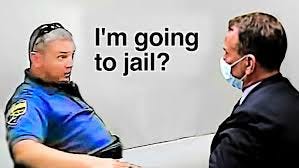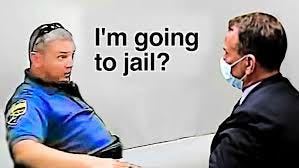Cop Culture
What living in a police family taught me about the dark mentality of law enforcement.
My neurotic housemate, whom we’ll call “Mike,” tells us he needs to store his gun on our upstate New York property. It’s Y2K, and he’s concerned our mountain compound could be under attack. By who or what is unclear, but because of Y2K, he needs to act as the de facto police. Robert and I object. “You can’t keep that here,” Robert tells Mike. “I can’t be in a house with a gun, Mike,” I add. Mike, a white man from Long Island, assumes Robert and I are bleeding-heart liberals against guns on principle. Robert explains about growing up in an abusive home. His mentally shaky father had a gun to “protect his family.” Robert’s family lived with the terror that the father’s mental health could deteriorate enough that he might actually use the gun – but on who? It dawned on Mike: there was a precedent; maybe we weren’t just weak, knee-jerk liberals. Maybe we had practical reasons to fear firearms and the people who wield them. Then I told him my story about growing up in a police family.
My parents divorced when I was seven, after which my mother immediately got together with a woman I’ll call “Barb,” for legal reasons. Barb wanted to be a police officer, allegedly to protect and serve. She attended the police academy, and I was present at her graduation, where she was commended with flying colors. She soon secured a police officer position for the City of Benicia, California, where Barb had grown up.
Barb was profoundly paranoid, and collected an arsenal of weapons to defend herself and her home. In the US, weapons kept at home do not require licenses, and Barb’s were fairly exposed. Despite being a young child, I could locate them immediately. At any time I could have had my little hand on a hunting knife, switchblade, mace, or handgun, unlicensed to kill. I didn’t touch them – I was afraid of these weapons, and their presence caused me to be hypervigilant, sometimes to the point of panic. But think of all the children who do put their hands on them. Way more kids are killed every year by a gun in the home than are potential intruders. Disturbed kids may take the guns to school and kill people. Having a gun at home is practically a guarantee that someone you love will shoot or get shot.
Even at my young age, it was not lost on me that Barb’s mental illness might go against her fitness to perform the best police work. Barb had very serious mood swings; she was either riding high with lots of energy, laughing, sleeping very little, driving her car really fast, and conversing with everyone she saw. Or, she was in a despairing depression that had her crying for days in bed, unable to do anything. She had been prescribed medication for manic depression, but it didn’t always seem to work. Every few months she went on a drinking binge and ended up beating my mother to a pulp, destroying everything in the house, and terrorizing my family. She seemed a lot worse off than someone suffering from typical manic depression.
But if the stories Barb brought home about her fellow police officers’ mental fitness to perform the job were true, Barb seemed wholly reasonable by comparison. What was going on with the police department that they did not address this very serious, glaring problem - the mental health of their police force?
You may want to believe there are good police. That being a cop doesn’t mean you are on a demented power trip. Understand that when you are dealing with a cop, you are dealing with someone whose experiences and culture have hollowed them out so much, that only a machine programmed to violently subdue others remains.
That human machine is dominated by fear. On the streets every day, in an antagonistic relationship with the public, police face a barrage of hatred. Domineering cops and suspicious public at odds every day. In this reality, every single person is a potential threat, and cops live in angst, even off duty. This is the negative loop they face that reinforces their need to control other people.
Plenty of individuals join the police academy with dreams of protecting their communities. But anyone with a conscience is pushed out of police work fairly early on. Maybe the potential good cops didn’t understand that police culture is not on the side of good. Cops are on their own side. Corruption, bribery, theft, bodily harm, and extralegal perks are ingrained aspects of cop culture. Cops and criminals are the same people with the same mentality. The only difference is that cops are municipally employed, while criminals are freelance. Those who remain on the police force have twisted into a clan who have come to expect the worst of human nature, because that’s what they’ve been exposed to every day. They hold a fundamental perception that all other people who are not police, especially black and brown people, are a threat. Trigger happiness is the only happiness they know.
Lying is a strategy cops use with impunity. They believe sincerity puts them at a disadvantage. This is not speculation; lying is a major tool in the cop’s authority box, and how to lie for a particular situation is part of police work. They know “justice” is fiction, and “law” can be manipulated. But when you lie all the time, it becomes a lot harder to discern the truth.
The thing is, cops can’t go back to a normal way of living after the things they do to people. This was, and has always been, the foundation of the cop’s emotional landscape.
When you encounter police, remember that you are dealing with a prevaricating and emotionally struggling individual, someone who drank the blood-flavored Kool-Aid. If you are in their presence or under their custody, never argue with them. Do not protest or show emotion. Your only response is “Yes, Officer,” or “No, officer.” Let the cop believe they are in charge at all times. If you don’t, their fear will surface, and they will take it out on you.
The bottom line is that a sociopathic-type personality is required to stay in the job of police officer. The job will make you develop one, even if, like Barb, you aren’t already predisposed. You will need to be convinced that you are the avenging angel, with full permission to exercise brutality, because you believe the people you are going after are a threat to the social order. But even Barb had her limits. After several years on the job, she shot someone in the leg. After that incident, she quit police work and assumed a similarly power-hungry, but less armed and trained role: security guard.
A couple of times in my childhood, I called the police when Barb had a manic episode and was beating the shit out of my mother. In the 1970s and ‘80s, not only was domestic violence considered a family matter in which the police would not become involved, the officers knew Barb was one of their own, and left the scene. The police abandoned me with a warning that I was not to become involved in adult matters, and I was subsequently punished by my mother and Barb.
Because of the trepidation I still have from the inside knowledge of living in a police family, I have attempted to have the most limited dealings possible with any police. One time the NYPD helped return my driver’s license after my wallet was stolen, and I appreciated that. But I have also experienced their brutality, and in no other times in my life have they helped me with anything else.
Like so many US institutions, it is clear the police are broken and need to be dismantled and built back up from scratch. Although “Defund the Police” sounds like a frenzied battle cry by fringe firebrands, rebuilding American police culture is exactly what is necessary. When a public institution created to protect and serve its people disdains them while blaming the victim, why do we fear reconstruction? Why do we hold on to old ways that no longer work? Is it out of some misplaced loyalty to the American government and its institutions? This is what elected Trump and built the MAGA faction. What “Defund the Police” suggests is actually a reallocation of police funds for some non-confrontational forms of public safety, such as community liaisons, officers on the beat who know their communities and do not carry guns, and public-facing initiatives to deter the issues that create crime, like poverty, mental illness, addiction, and undereducation.
Who would make you feel safer? A gun-toting cop who assumes you are at fault, and treats you with contempt? Or an officer of the peace, whose job it is to talk with people and canvass the community, knowing the players and the problems, and able to help extinguish the circumstances that lead to crime before it happens?
Deeply imagine your country without police who instigate fascist violence, particularly against people of color. Imagine if there was no ICE. If we can envision it, it can be done. Democracy is a system in which The People decide how the country is run and operated – not rampant law enforcement.





